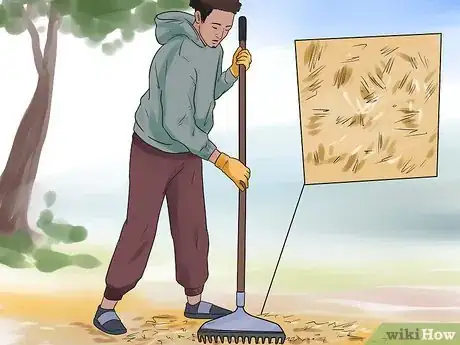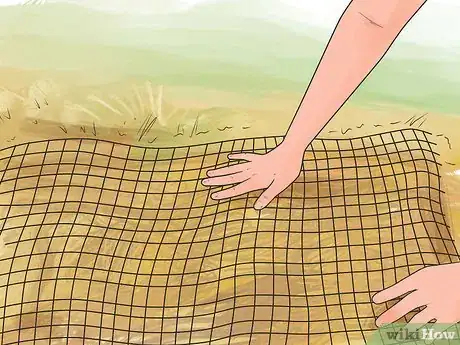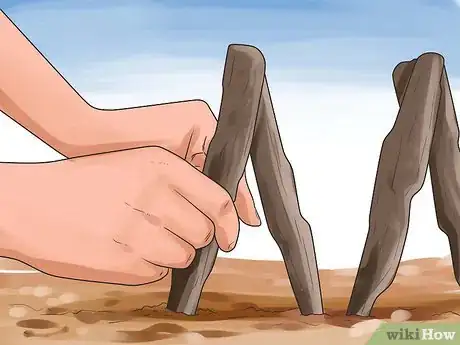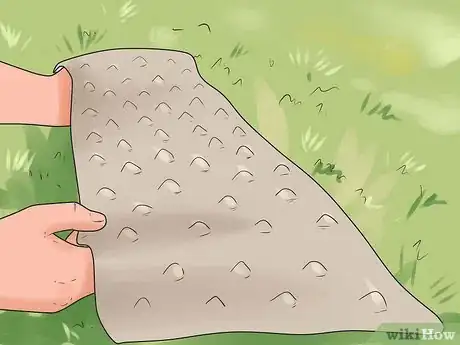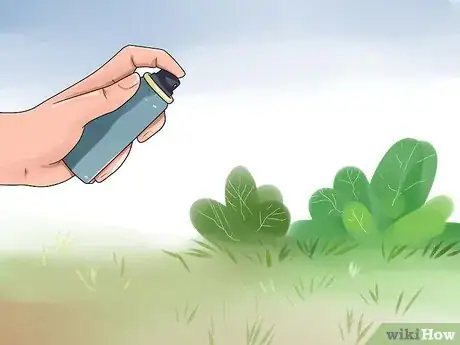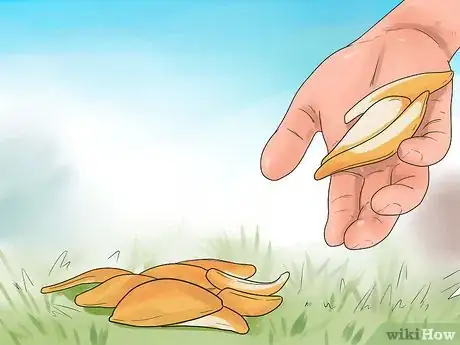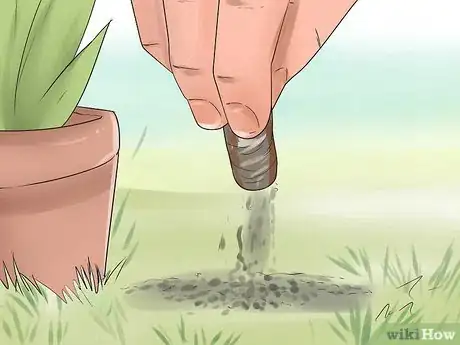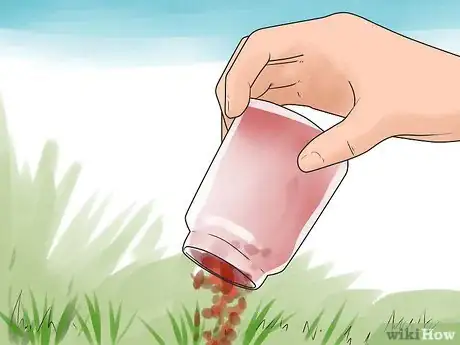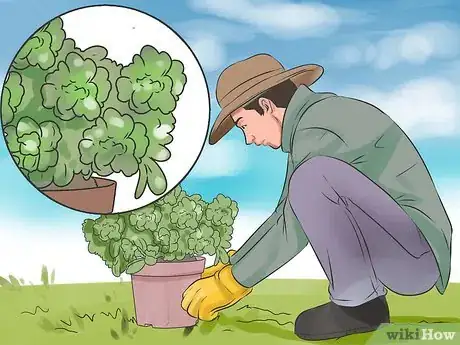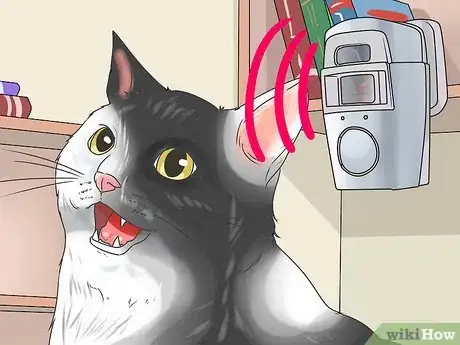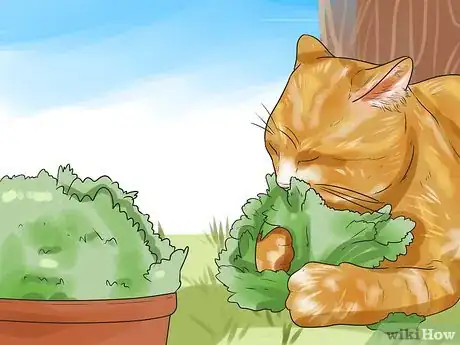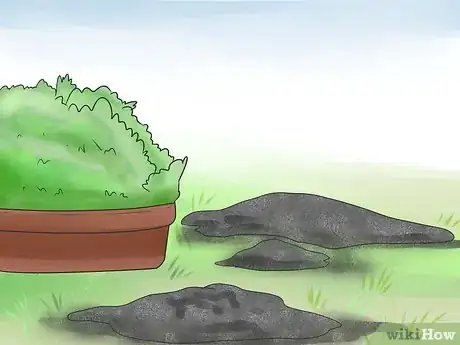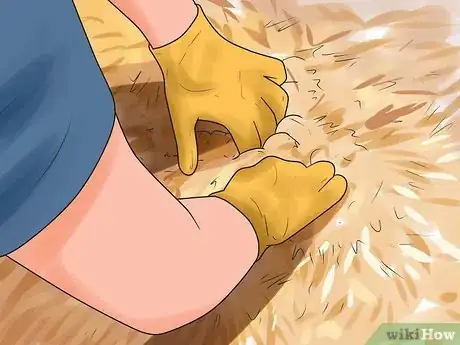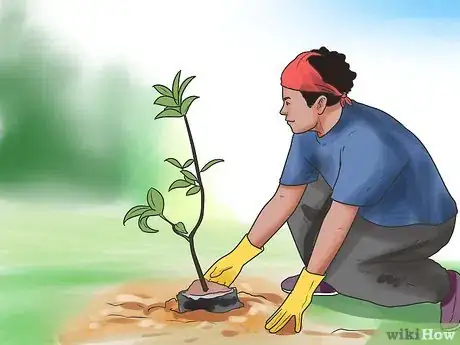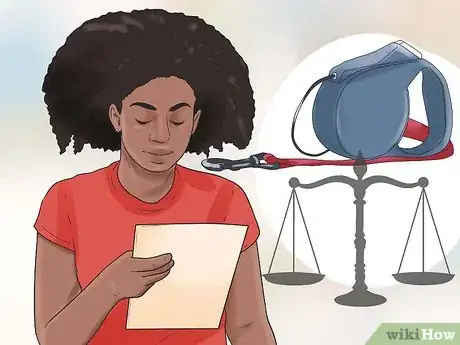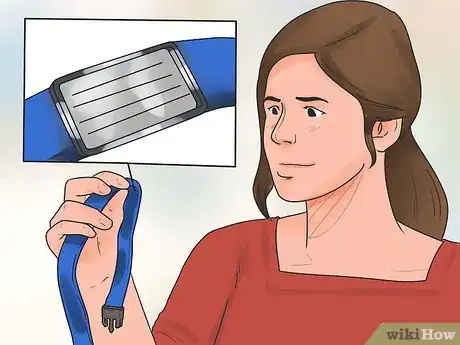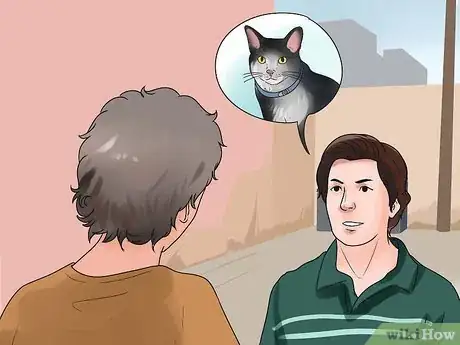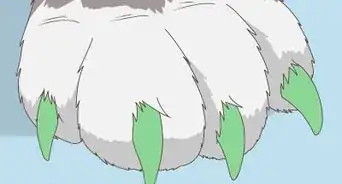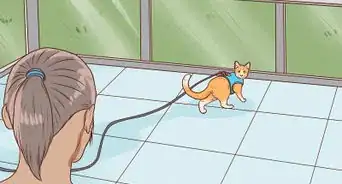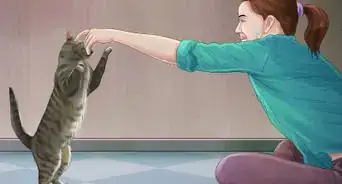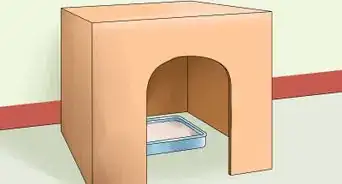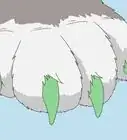This article was co-authored by Pippa Elliott, MRCVS. Dr. Elliott, BVMS, MRCVS is a veterinarian with over 30 years of experience in veterinary surgery and companion animal practice. She graduated from the University of Glasgow in 1987 with a degree in veterinary medicine and surgery. She has worked at the same animal clinic in her hometown for over 20 years.
wikiHow marks an article as reader-approved once it receives enough positive feedback. This article has 16 testimonials from our readers, earning it our reader-approved status.
This article has been viewed 1,676,809 times.
Cats tend to use gardens as their personal outdoor litter boxes. If your own cats or neighborhood cats use your garden as a litter box, you can discourage this behavior or prevent it altogether. The best way is to keep the cats out of the garden in the first place, and these inexpensive solutions will help you achieve your goal.
Steps
Making the Garden Unattractive to Cats
-
1Mulch the garden. Most cats don't like the feel of large pieces of mulch, so they will avoid the areas with it. In addition, part of the attraction of a garden is the fresh dirt, which most cats view as a litter box. By covering up the fresh dirt, you make that area less inviting.[1]
-
2Try concrete-reinforcing wire or chicken wire with 1-inch openings. You can lay this wire across the paths that lead to your garden. Cats do not like the openings in the wire on their paws and will usually stay away.[2]
- You can also lay the wire across your beds and cover it with mulch. Use wire cutters to create holes for your plants, and bend the ends of the wire down, pressing them into the ground. This wire deters cats from using the dirt as a litter box and from clawing at the dirt.[3]
Advertisement -
3
-
4Place spike mats in the garden. Though these mats sound malicious, they are not harmful to the cats. They have small plastic spikes on the mats that cats don't like walking on. You cut the mat into pieces and then set them along your beds.[6]
-
5Use an odor repellant. These types of repellants, which you can find at local gardening and hardware stores, come in granules or sprays. Cats do not like the smell, so it will keep them out of the area.[7]
- Granules are better if you need to cover a large area. If you want to keep cats away from a certain plant, the spray is easier. You will need to renew this when you see cats coming back in your yard.[8]
- Lion dung is an effective repellant that you can buy online. The cat is scared off because it thinks a bigger predator is around.
-
6Use citrus. Most cats do not like the smell of citrus. One easy method is to scatter citrus peels around the yard, though you will need to replenish them frequently.[9]
- Instead of peels, you can use sprays that have citrus scents. You can also dissolve citrus essential oils and spray it around your garden. Simply dissolve 10-15 drops of oil in a cup of water, and place it in a spray bottle.[10]
-
7Try other strong scents. For instance, cats don't like the smell of pipe tobacco or coffee, so you can spread the grounds or used tobacco around your plants to keep the cats out.[11]
- Alternatively, you can spray a vinegar and water solution around the yard, or you can dissolve 10-15 drops of lavender or eucalyptus oil in a cup of water to spray the yard, as well. You will need to spray these periodically to keep the cats out.[12]
-
8Spread crushed pepper. Some people have had luck with spreading crushed red pepper around the garden. However, you need to spread it around again after each rainfall.[13]
-
9Plant rue. Cats avoid this plant because of its odor. Though it can be poisonous to cats, they will avoid it completely rather than chewing on it.[14]
-
10Use motion detectors. You can use either ultrasonic or water motion detectors in your garden. You place them around your garden, and when a cat comes in, the motion activates a sensor. Depending on the kind you use, it either creates an ultrasonic sound that humans can't hear or sprays the area with water, both of which deter the cats. Some even combine the two approaches.[15]
- If you see a cat while you're in the garden, you can try giving him a gentle spray with the hose to run him out.[16]
Making Other Areas More Attractive to Cats
-
1Choose a sunny spot. Many cats love being in the sun, so pick an area that is sunny at least part of the day.
-
2Plant catnip. Cats love catnip and cat mint, and you can distract them from your garden by planting it in another part of the yard. Cats will be drawn to that area rather than to your tomato plants. Be warned, though, that this method may draw more cats to your yard.[17]
-
3Create a sand patch. In addition, till up an area near the catnip and spread sand on top. Cats will enjoy napping in the area, keeping them free of your garden.[18]
- Cats may use this area as a litter box, so you will need to clean up the area regularly. However, it will likely keep them from going in other areas in your garden.[19]
-
4Spread fine mulch around the area. While cats don't like heavy mulch, they do like digging in fine mulch, so it will attract them to the area.[20]
-
5Try other plants cats love. Cats also like wheat berries, flax, oat grass, barley grass, and lemongrass to name a few.[21]
Contacting the Owners and Authorities
-
1Check on leash laws in your areas. Most cities won't let animals be outside without leashes on. Once you know the laws, it gives you the authority to do something about the cats roaming in your garden.[22]
-
2Find the owner. Check the cat collars, if possible, to find the owner, as many collars include a phone for the cat's home or, at the very least, the cat's vet office. You can also watch to see where the cat goes when she leaves your garden.[23]
-
3Talk to the owner. If it's a neighbor's cat, talk to the neighbor about the problem. Inform him or her of the leash laws, and ask the owner to keep the cat inside. You can threaten to call animal control if the cat continues to come over.[24]
-
4Call animal control. If the cat is a stray or if a neighbor's cat continues to come over, you can call animal control to pick up the animal.[25]
Expert Q&A
-
QuestionHow can I stop my dog eating poop that neighborhood cats leave in the garden?
 Pippa Elliott, MRCVSDr. Elliott, BVMS, MRCVS is a veterinarian with over 30 years of experience in veterinary surgery and companion animal practice. She graduated from the University of Glasgow in 1987 with a degree in veterinary medicine and surgery. She has worked at the same animal clinic in her hometown for over 20 years.
Pippa Elliott, MRCVSDr. Elliott, BVMS, MRCVS is a veterinarian with over 30 years of experience in veterinary surgery and companion animal practice. She graduated from the University of Glasgow in 1987 with a degree in veterinary medicine and surgery. She has worked at the same animal clinic in her hometown for over 20 years.
Veterinarian It's bizarre how some dogs are addicted to cat poop! There's no easy answer, especially when cats that don't belong to you do the pooping. The first step is to do a poop patrol each morning and scoop up any overnight offerings. Another good idea is to teach the dog a solid "Leave it" command. Do this using two different types of treat (one low value and one high value) and reward the dog with the high value treat when he leaves the low value one.
It's bizarre how some dogs are addicted to cat poop! There's no easy answer, especially when cats that don't belong to you do the pooping. The first step is to do a poop patrol each morning and scoop up any overnight offerings. Another good idea is to teach the dog a solid "Leave it" command. Do this using two different types of treat (one low value and one high value) and reward the dog with the high value treat when he leaves the low value one. -
QuestionMy neighbor feeds feral cats, about 20 of them, who then poop in my garden. The neighbor won't stop feeding the cats. What can I do?
 Pippa Elliott, MRCVSDr. Elliott, BVMS, MRCVS is a veterinarian with over 30 years of experience in veterinary surgery and companion animal practice. She graduated from the University of Glasgow in 1987 with a degree in veterinary medicine and surgery. She has worked at the same animal clinic in her hometown for over 20 years.
Pippa Elliott, MRCVSDr. Elliott, BVMS, MRCVS is a veterinarian with over 30 years of experience in veterinary surgery and companion animal practice. She graduated from the University of Glasgow in 1987 with a degree in veterinary medicine and surgery. She has worked at the same animal clinic in her hometown for over 20 years.
Veterinarian Your neighbor is obviously concerned for the welfare of the cats. However, 20 is a lot of cats in one area, and it might be the cats are not neutered and still breeding. The first thing to do is stop the population increasing further, so contact a cat welfare charity about a TNR program for that colony. The charity may be able to suggest appropriate places in the country to rehome some of the cats, so they can fend successfully for themselves and decrease the pressure on resources in your area.
Your neighbor is obviously concerned for the welfare of the cats. However, 20 is a lot of cats in one area, and it might be the cats are not neutered and still breeding. The first thing to do is stop the population increasing further, so contact a cat welfare charity about a TNR program for that colony. The charity may be able to suggest appropriate places in the country to rehome some of the cats, so they can fend successfully for themselves and decrease the pressure on resources in your area. -
QuestionMy neighbor feeds the feral cats who then poop in my yard. I can't let my dog out until I've cleaned up every morning. What can I do?
 Pippa Elliott, MRCVSDr. Elliott, BVMS, MRCVS is a veterinarian with over 30 years of experience in veterinary surgery and companion animal practice. She graduated from the University of Glasgow in 1987 with a degree in veterinary medicine and surgery. She has worked at the same animal clinic in her hometown for over 20 years.
Pippa Elliott, MRCVSDr. Elliott, BVMS, MRCVS is a veterinarian with over 30 years of experience in veterinary surgery and companion animal practice. She graduated from the University of Glasgow in 1987 with a degree in veterinary medicine and surgery. She has worked at the same animal clinic in her hometown for over 20 years.
Veterinarian Try letting the dog out into the yard at different times of day, so the unpredictable presence of the dog acts as a deterrent to the cats entering the yard. Also, substances that smell of alpha predators (lion poop!) are said to strongly deter cats. Lion dung can be purchased online. Place some where the cats toilet, and also along the boundary of your property to act as a scent deterrent.
Try letting the dog out into the yard at different times of day, so the unpredictable presence of the dog acts as a deterrent to the cats entering the yard. Also, substances that smell of alpha predators (lion poop!) are said to strongly deter cats. Lion dung can be purchased online. Place some where the cats toilet, and also along the boundary of your property to act as a scent deterrent.
Warnings
- Whatever method you choose to deter cats from using your garden as a litter box, ensure that it is both environmentally safe and safe for the cat or any other birds or animals that may come into your yard and garden. Try to use natural and safe products instead of chemicals, and always check the labels on any products for safety hazards.⧼thumbs_response⧽
References
- ↑ http://pss.uvm.edu/ppp/articles/cats.htm
- ↑ http://www.ext.nodak.edu/extnews/hortiscope/pests/cat.htm
- ↑ http://www.colostate.edu/Dept/CoopExt/4DMG/Pests/animal.htm
- ↑ http://www.sanantonio.gov/AnimalCare/WhatWeDoServices/OutdoorCatsTNR.aspx
- ↑ http://www.sanantonio.gov/AnimalCare/WhatWeDoServices/OutdoorCatsTNR.aspx
- ↑ http://www.longbeach.gov/acs/about_us_information/community_cats.asp
- ↑ http://www.colostate.edu/Dept/CoopExt/4DMG/Pests/animal.htm
- ↑ http://www.colostate.edu/Dept/CoopExt/4DMG/Pests/animal.htm
- ↑ http://www.longbeach.gov/acs/about_us_information/community_cats.asp
- ↑ http://www.longbeach.gov/acs/about_us_information/community_cats.asp
- ↑ http://www.longbeach.gov/acs/about_us_information/community_cats.asp
- ↑ http://www.longbeach.gov/acs/about_us_information/community_cats.asp
- ↑ http://pss.uvm.edu/ppp/articles/cats.htm
- ↑ http://www.longbeach.gov/acs/about_us_information/community_cats.asp
- ↑ http://www.longbeach.gov/acs/about_us_information/community_cats.asp
- ↑ http://pss.uvm.edu/ppp/articles/cats.htm
- ↑ http://pss.uvm.edu/ppp/articles/cats.htm
- ↑ http://pss.uvm.edu/ppp/articles/cats.htm
- ↑ http://www.sanantonio.gov/AnimalCare/WhatWeDoServices/OutdoorCatsTNR.aspx
- ↑ http://www.seattle.gov/animal-shelter/animal-control/outdoor-cats
- ↑ http://www.seattle.gov/animal-shelter/animal-control/outdoor-cats
- ↑ http://www.ext.nodak.edu/extnews/hortiscope/pests/cat.htm
- ↑ http://www.ext.nodak.edu/extnews/hortiscope/pests/cat.htm
- ↑ http://www.ext.nodak.edu/extnews/hortiscope/pests/cat.htm
- ↑ http://www.ext.nodak.edu/extnews/hortiscope/pests/cat.htm
About This Article
To prevent cats from pooping in your garden, try putting down a layer of mulch wherever you can since cats don't like the feeling of it. You can also lay sticks or branches in a criss-cross pattern across your plant beds, which will keep cats from stepping in those areas. Also, try spraying your garden with equal parts water and vinegar or sprinkling coffee grounds everywhere since the smell of vinegar or coffee will deter cats. Even just spreading some citrus peels around your garden can help keep cats away because of the smell. To learn how to divert cats away from your garden by making other places more attractive to them, scroll down!
